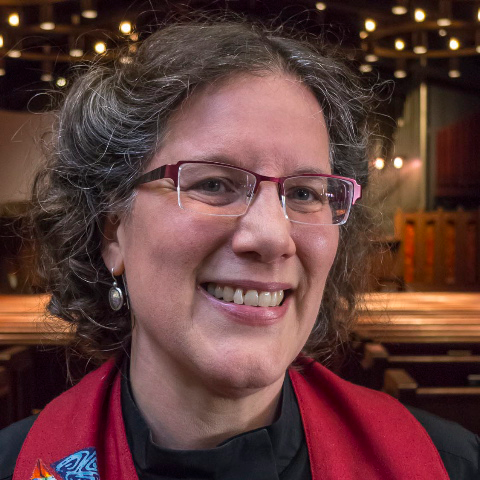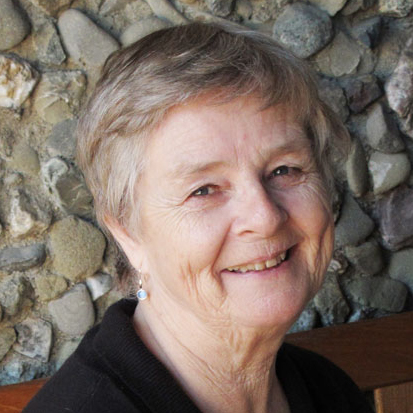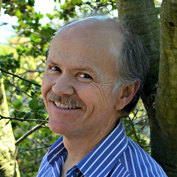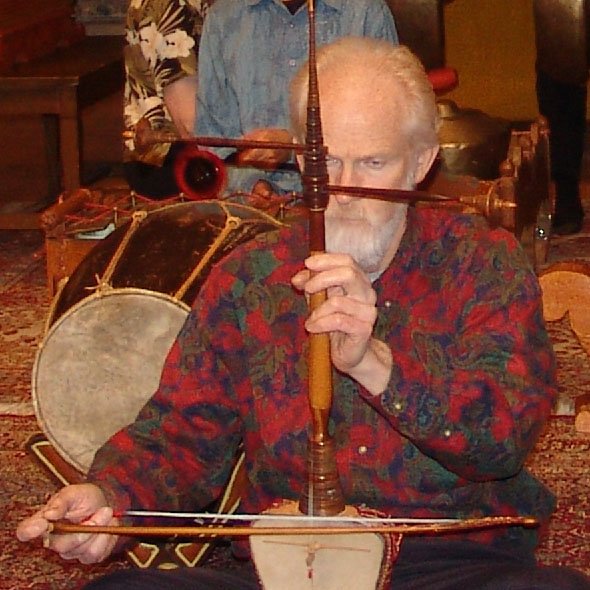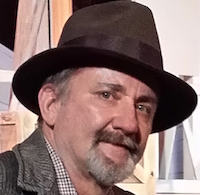Reading
Let all creation rejoice and praise.
You have just heard (or in a moment you will hear) composer Benjamin Britten’scelebration of Christopher Smart’s poem For I will consider my Cat Jeoffry.
Christopher Smart lived in London in the 1700s. He wanted to pray without ceasing and was known to fall down on his knees on the streets in gratitude whenever he saw an example of the warmness or kindness of humanity. In his poem Christopher Smart pays homage to his cat “For he is the servant,” he says, “of the Living God, duly and daily serving him.
He pays homage to Jeoffry, his cat, as the sunrises, ”For, he says, “at the first glance of the glory of God in the East he worships in his way.”
(Now) here is poet Edward Hirsch’s reflection on Christopher Smart’s poem.
Edward Hirsch’s poem is called Wild Gratitude (adapted)
Tonight when I knelt down next to our cat, Zooey…
And rubbed her…belly…
And watched her wriggle onto her side, pawing the air,
And listened to her solemn little squeals of delight,
I was thinking about the poet, Christopher Smart,
Who wanted to kneel down and pray without ceasing…
his wild gratitude… his prayers…
And his great love for his speckled cat, Jeoffry…
But it wasn’t until tonight when I knelt down [next to our cat, Zooey and listened to her]
That I remembered how he’d called Jeoffry ‘the servant
Of the Living God duly and daily serving Him,’
And for the first time understood what it meant.
Because it wasn’t until I saw my own cat
Whine and roll over on her fluffy back
That I realized how gratefully he had watched
[his cat] Jeoffry… stretching, calmly sharpening
His claws on the woodpile,
rubbing his nose against the nose of another cat,
slowly stalking,
jumping across the grass in the wet garden,
And only then did I understand It is Jeoffry—and every creature like him—
Who can teach us how to praise—purring In their own language,
Wreathing themselves in the living fire.
House of Music
This is a congregation who engages in interfaith work for justice and stands on the side of love. This is a learning community. And this is a house of music and of the arts. Writing groups, dancers. arts and crafts groups, flower arrangements, reader’s theater, drama, musicals, concerts; all praise in their own way. Today’s reading and the song celebrate that the cat Jeoffry and every creature like him teach us how to praise.
Singing, playing an instrument, dancing, moving, writing, creating, speaking, cooking, teaching, witnessing for justice, purring can all be ways to praise. This congregation helps you find your own way. Find your language, your way to rejoice and give thanks for the miracle and glory of being alive.
Today on Music Sunday, we celebrate how music brings us into the sweet holy mystery of life.
What songs touch your heart, inspire your action, raise your spirits, bring tears to your eyes, make you sway and clap your hands?
UUCB is blessed with a magnificent choir, a Youth and Children’s Choir, the harmonizing trio Muse Crossing, the Early Birds choir, organ, harpsichord, an Indonesian gamelan, flute, harp, brass, guitar, fiddle, percussion, chimes, and tone bars!
You have a talented core music staff: Director of Music Dr. Bryan Baker, organist Katya Kolesnikova, and Cantor and Youth and Children’s Choir Director Michèle Voillequè. Not only do they shine in their musical offerings, quietly behind the scenes they make worship go smoothly. A blessing for Barbara’s and my ministry has been planning and reviewing worship at our weekly staff meetings, and worshiping with them.
Anyone can sing, Michèle Voillequè tells us and she teaches us how. “The prayers are like music. The music like prayers.” So said 14 year old Lindsey Lam last Sunday in her poem “We are the Unitarian Universalist Church of Berkeley.”
“The prayers are like music. The music like prayers.”
Music is central to the life of this church. I bet you didn’t know that at our monthly administrative staff meetings, we have a time of check-in and the naming of joys and sorrows.
We name our own heart breaks, challenges, accomplishments, and good times. If anyone of us knows someone in the congregation is having surgery, recovering from illness, in a time of hurt or loss, we name this to the others. We hold each person we name in our thoughts. After each staff person’s sharing we sing. We take turns leading the singing and we sing harmony. Many times the song we sing is, “All this joy, all this sorrow, all this promise, all this pain. Such is life, such is being, such is spirit, such is love.”
The two of us invite the Board of Trustees and the Coordinating Team to consider singing between agenda items or to begin or conclude their meetings.
In this house of music, music flows sometimes under spoken words. Hymn medleys weave parts of the service together. A soloist sometimes sings as part of the meditation and prayer or a song becomes embodied in dance. Music can express our deepest grief, take us into our despair and deepest longings and lead us into hope and exaltation.
Music opens us, touches places we might not even know were there to be touched.
Last Sunday Bryan played Somewhere Over the Rainbow. Tears came to my eyes. What does this song touch in me? I want to believe somewhere there’s a place where we can experience all we most long for. I guess I probably did glimpse that land once in a lullaby. If we are fortunate, once arms cradled us, voices cooed over us, sang to us, eyes beheld us and we were embraced in love. We long for this love. In moments now we know this love. At our best, we give this love.
During baby blessings we all sometimes join our voices in singing Sleep, my child and peace attend you all through the night. Sweet longings for our babies to know loving presence are expressed. Mother, I can feel you near me, all through the night. Father, I know you can hear me, all through the night.
The song reminds us of the circle of life. And when I am your age nearly, still I will remember clearly how you sang and held me dearly all through the night. As we sing, I feel gratitude for loved ones who have watched over us. I feel grateful for the babies I’ve held and rocked.
I picture our daughter Laura in New Hampshire who is pregnant and due to give birth on June 1. I want to cradle this baby, our grandchild. I want every child, everywhere, to be held in safety, in loving vigil all through the night.
At the bedside of the dying, the two of us sometimes name, one by one, all the people we know who love this person. We say, “their love holds you now. May you trust in that love, rest and be held by that love. Love surrounds you.” We give thanks for the person’s life. We tell some of the stories we know about them. We name memories of times shared and gifts given. We thank them. And when there are no more words, we sing “Spirit of Life. If you know it, sing with us,
Spirit of Life, come unto me.
Sing in my heart all the stirrings of compassion.
Blow in the wind.
Rise in the sea.
Move in the hand giving life the shape of justice.
Roots hold me close, wings set me free,
spirit of life come to me, come to me.”
Music can carry us through transitions, bring comfort and peace. Whenever Barbara and I hear Ashokan Farewell, the waltz theme song for the PBS Civil War series by Ken Burns, we remember the memorial services for both of my parents
where Ashokan Farewell was played by solo fiddle.
When I hear Chopin’s Polonaise in A flat, I think of my home congregation, and one of my former high school English students, Peter, a pianist, who said he would perfect the polonaise by the time of my own memorial service. Music connects us with loved ones over time and space. The hymn Bring Many Names offers many beautiful and good images of the divine, male, female, old, young, dark, light. The divine is described as known and as mystery beyond our knowing, beyond us yet as close as breath.
In this song of the many names for the divine when we sing “strong mother god working night and day, I picture my own mother cooking, washing the dishes, cleaning the kitchen counter.” When we sing “warm father god feeling all the strains of human living, caring and forgiving,” I give thanks for my own loving, gentle father. People who have been like parents, teachers and mentors, loved ones, people in this very room come into my heart. When we get to the verse, “old, aching God, grey with endless care, wiser than despair,” I picture people we love and see age who soften and open and guide us. The verse young growing God, eager to know, willing to be changed, quick to be delighted takes us round the circle as life continues on with the next generations.
Lastly the song reminds us the divine has more mystery, Is greater than we will ever fully know, Is closer yet than breathing, and our everlasting home. I am filled up and overflowing with gratitude and love.
In the hymn This Is My Song, we sing of my home, the country where my hearts is and how my land has sunlight beams on clover leaf and pine. Then we sing but other lands have sunlight too and clover. A shift turns the heart, and the song is prayer, a deep heart-felt prayer, for peace for their lands and for mine.
Music can remind us of what’s most important, most dear. As we sing together, tears sometimes come for this dream we dare to dream that somewhere over the rainbow, someday, peace will come true, all babies will be welcome to loving arms,
all ages will be valued, when it comes time to die we will do so in gratitude, peace and love and life will go on.
Somewhere skies are blue
and the dream that you dare to dream really will come true.
Amen.
Closing words
Invitation to join hands…
Look around at one another.
You are so beautiful.
After the choir sings and we extinguish the chalice,
we invite you to greet people around you
a momentary gift of attention,
a spiritual gift of recognition.
Praise in your own language.
Rejoice and give thanks for the glory of being alive.
Love one another.
Copyright © 2014, Revs. Bill and Barbara Hamilton-Holway. All Rights Reserved.







